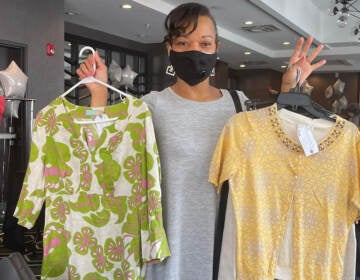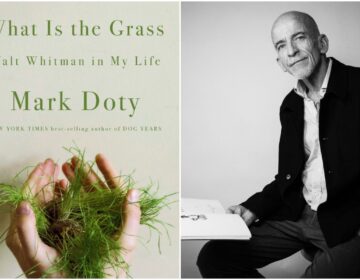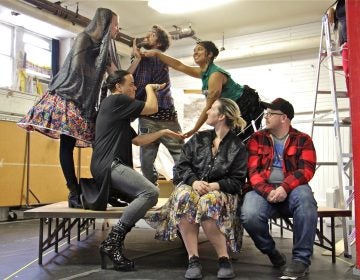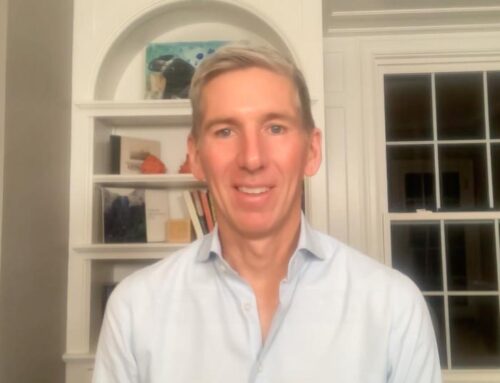Earth Day 2025: Celebrating Philly’s environmental legacy and the power of poetry
April 22, 2025
This story is part of the WHYY News Climate Desk, bringing you news and solutions for our changing region.
From the Poconos to the Jersey Shore to the mouth of the Delaware Bay, what do you want to know about climate change? What would you like us to cover? Get in touch.
On this Earth Day, WHYY “Morning Edition” host Jennifer Lynn takes a poetic detour with Climate Desk reporter Susan Phillips to reflect on the emotional power of nature through verse.
Earth Day was first celebrated in Philadelphia on April 22, 1970, at Fairmount Park, where thousands gathered to advocate for a cleaner, safer environment.
Among the highlights was poet Allen Ginsberg, who delivered his poem “Earth Pollution,” marking the start of a long-standing connection between poetry and environmental advocacy.
From Ginsberg’s raw protest to Amanda Gorman’s stirring reflections and Walt Whitman’s enduring imagery, this segment explores how poetry has captured the spirit of the natural world across generations.
This interview and the poems read over the radio have been edited and styled for clarity and consistency.
__
Jennifer Lynn: This is WHYY’s “Morning Edition.” Good morning. I’m Jennifer Lynn. Today is Earth Day, which has deep roots in Philadelphia. The day celebrates environmental protection — a multifaceted topic. Susan Phillips of WHYY’s Climate Desk brings it into focus for us year-round as an energy and environment reporter. This morning, Susan steps away from science and joins me to talk about thoughts and feelings about nature, summed up in poetry with some of the greats. Good morning, Susan.
Susan Phillips: Morning, Jennifer.
JL: My thinking is: It is National Poetry Month and Earth Day. Why not combine the two in a conversation this morning?
SP: That’s right, Jennifer. Fifty-five years ago, the first Earth Day took place here in Philadelphia, in Fairmount Park. A very popular event — there were 20 to 40,000 people gathered in Fairmount Park for these Earth Day festivities that included the poet and writer Allen Ginsberg.
Allen Ginsberg: “Earth pollution is mind pollution. Consciousness pollution identical with filthy sky, dirty-thoughted usury, simultaneous with capitalist metal, dust in water courses, murder of great and little fish, same as self-besmirchment, masturbatory thought control, Mace repression, identical with DDT extinction of the bald eagle.”
JL: The late Allen Ginsberg on the first Earth Day, which was here in Philadelphia 55 years ago. He was known for embodying counterculture. He wrote beat literature and confessional poetry. Let’s just say he never held back.
SP: No, he didn’t. But let’s take a listen to a more contemporary poet — poet and activist Amanda Gorman. She was the first person to be named National Youth Poet Laureate, and many folks may remember that she rose to fame in 2021 for writing and delivering her poem “The Hill We Climb” at the inauguration of [President] Joe Biden. She’s also done a lot of nature poetry. Here she’s performing an earlier poem of hers, “Earthrise.”
Amanda Gorman:
“On Christmas Eve, 1968, astronaut Bill Anders
Snapped a photo of the earth
As Apollo 8 orbited the moon.
Those three guys
Were surprised
To see from their eyes
Our planet looked like an earthrise
A blue orb hovering over the moon’s gray horizon,
with deep oceans and silver skies.
It was our world’s first glance at itself
Our first chance to see a shared reality,
A declared stance and a commonality;
A glimpse into our planet’s mirror,
And as threats drew nearer,
Our own urgency became clearer,
As we realize that we hold nothing dearer
than this floating body we all call home.”
JL: Amanda Gorman, reading and performing her poem “Earthrise.” I’m here with Susan Phillips from our Climate Desk on Earth Day, pointing out poignant writings about nature. Susan, let’s go way back to “Leaves of Grass.”
SP: Yes — the American poet Walt Whitman. He self-published this volume of poetry back in 1855. Walt Whitman is known as the “father of free verse.” So you could trace both Allen Ginsberg and Amanda Gorman’s poetry all the way back to Walt Whitman, who had a local connection here, Jennifer. He lived out his final years in Camden, New Jersey — and you know, folks can still go and tour his home there.
JL: Can you channel your inner Walt Whitman?
SP: I will try to channel my inner Walt Whitman.
JL: OK, I’d love for you to read something from “Leaves of Grass.”
SP: OK, this is a little tiny section from “Sea-Drift”:
“Two feather’d guests from Alabama, two together, and their nest, and four light-green eggs spotted with brown. And every day the he-bird to and fro near at hand. And every day the she-bird crouch’d on her nest, silent, with bright eyes. And every day I, a curious boy, never too close, never disturbing them, cautiously peering, absorbing, translating.”
JL: Oh, I love it. I love it —
SP: … especially now when we’ve got lots of birds migrating into this area. And I just love that he said “guests from Alabama.” You know, these birds come from all over the place.
JL: Yeah, a guest. Well, I found some lovely [poems] by Sonia Sanchez, and I’ll read a few of those. How about this one:
“your limbs
fly off the ground
little birds”
SP: Staying with the bird theme.
JL: This one is interesting, a little bewildering:
“blue midnite
breaths sailing on
smiling tongues”
And this one — very pretty:
“say no words
time is collapsing
in the woods”
You know how you don’t feel time in the woods?
SP: You don’t.
JL: Yeah. So that was Sonia Sanchez — American poet, writer and scholar — was a huge figure in the Black Arts Movement here in Germantown in Philadelphia.
SP: Beautiful.
JL: Susan, you brought another book of poetry with you by Denise Levertov.
SP: Yeah, she’s one of my favorites. She was considered a Black Mountain poet, which is basically the school of poetry that — again — free verse, avant-garde, experimental. But I really like this poem: “The Mockingbird of Mockingbirds.” We kind of hear them all the time doing car alarms in the city. But they’re not the most flamboyant bird — but we all hear them all the time. So I just love this little piece:
“A greyish bird
the size perhaps of two plump sparrows,
fallen in some field,
soon flattened, a dry
mess of feathers —
and no one knows
this was a prince among his kind,
virtuoso of virtuosos,
lord of a thousand songs,
debonair, elaborate in invention, fantasist,
rival of nightingales.”
JL: Yeah, yeah, yeah, yeah.
SP: So, a lot of times we hear these birds singing. We don’t know who it is — but oftentimes, it is a mockingbird — someone else’s song.
JL: We try to figure out the different calls. Well, this was great fun. Thank you, Susan.
SP: Thank you, Jennifer.
JL: Susan Phillips of WHYY’s Climate Desk on Earth Day. Maybe we should have called it Birding Day.
SP: With a lot of bird poetry here.
JL: Thanks again.
SP: Thank you. Bye.

Saturdays just got more interesting.
WHYY is your source for fact-based, in-depth journalism and information. As a nonprofit organization, we rely on financial support from readers like you. Please give today.
Search
RECENT PRESS RELEASES
Related Post







